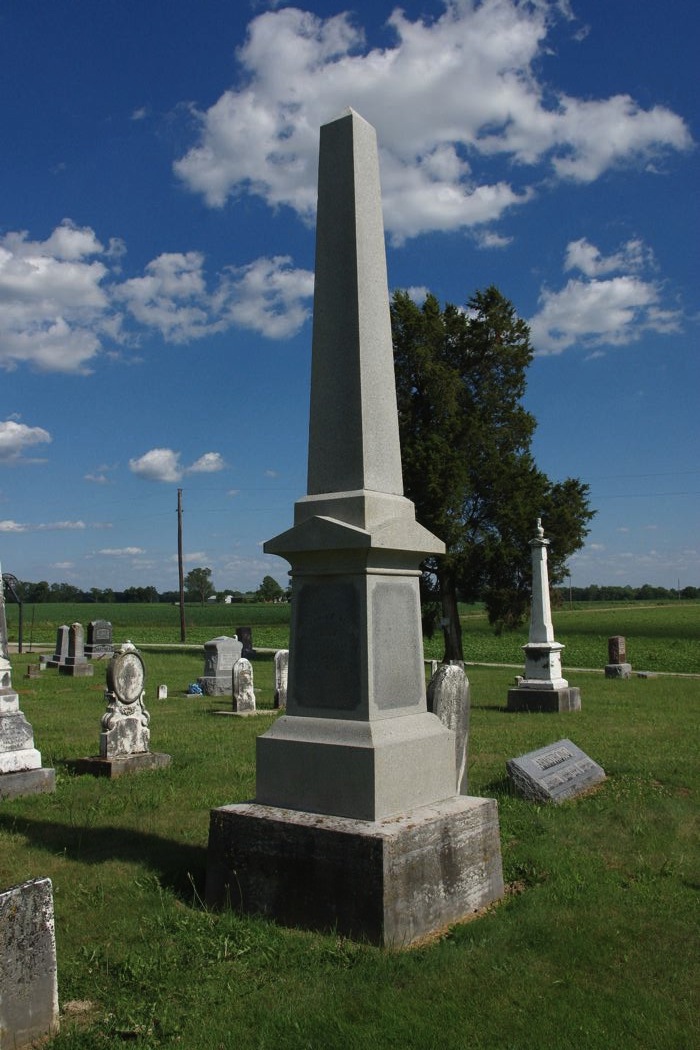Benjamin Franklin Reeve
1798-1877
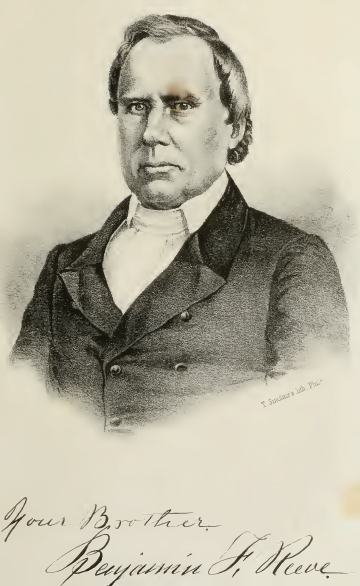
![]()
The Life Of Benjamin Reeve
Elder Benjamin F. Reeve was born in Prince William County, Virginia, on the 28th of October, 1798. He is of Welch descent with a slight mixture of Scotch and Irish. Tradition has it, that, very early in the history of this country, four brothers by the name of Reeve emigrated from Europe and settled in four different and distant parts of what is now the United States; and that from the said brothers have descended all of that name in America. Near the beginning of the present century his grandfather, Asa Reeve, removed from Virginia to Fleming county, Kentucky, where he died more than forty years ago. He was a most zealous Methodist, and the most of his family embraced the faith in which they were brought up. Two of his sons became Methodist preachers, but Benjamin, the father of Benjamin F., never made any profession of religion; and especially did he not receive the doctrines of the Methodists. He rejected all creeds, human and divine, and made one for himself, which contained only a single article, namely. Whatsoever things are honest. He was careful to observe but one commandment: "Thou shalt not steal." He employed in his family but one exhortation: " Let us walk honestly, as in the day." With him, as with multitudes now, honesty constituted the whole of religion: upon it hung all the law and the prophets; as if the Messiah had said to his apostles, " Go ye into all the world and preach honesty to every creature. He that deals honestly according to the decisions of his own mind shall be saved, but he that defrauds in any matter shall be damned." This being his faith, he sought to implant no other in the minds of his children, who therefore grew up as free from religious bias as it is possible for human nature to be.
When Elder Reeve was six years old his father removed from Virginia to Kentucky, and settled in Mason county, about six miles below Maysville and near the Ohio river, whose waters were then disturbed only by the light canoe of the Red Man and the clumsy keels of the Whites. When quite young he was sent to school until he learned to spell, read and write with tolerable proficiency. When sufficiently old to work, he employed his time mainly in agricultural pursuits, yet he went to school more or less each winter until he arrived at manhood. He then attended a kind of high school for a year or two, in which, by diligent application, he acquired what was then regarded as an excellent English education. Soon after completing his studies he was married to Miss Elizabeth D. Driskell. She subsequently followed him into the Reformation, and has long since preceded him to the Spirit land.
After his marriage he engaged in the business of teaching, which he prosecuted successfully and exclusively for fifteen years. At the expiration of that time he abandoned the profession, having demonstrated by actual experiment that, by teaching, he could make no more than a bare living for himself and his family.
The religious element of the community in which he lived was composed principally of Methodists, Baptists, and Newlights. The meetings of these several denominations he attended quite regularly from his boyhood to his thirtieth year. This he did, not for the purpose of ascertaining the will of God and doing it, but merely to listen to the extravagant logic of the preachers, and find agreeable companions with whom to while away the sluggish hours of the Sabbath. The pious quarrels indulged in by those three religious orders, with reference to election and free grace, and sundry other matters set forth in their creeds, were not well calculated to influence, in the right direction, a mind early taught to criticize the strife and divisions existing among the professed disciples of the Prince of Peace. Under such circumstances he made little or no progress toward the kingdom. So disgusted was he with conflicting doctrines, that he never seriously thought of searching out the narrow way. He knew but little about religion, and, if possible, cared less. With some of the more interesting portions of the Old Testament he had a slight acquaintance. He had read of the creation, of Noah and his ark, of David and Goliath; he was familiar with the story of Joseph and his brethren, and had some skeptical recollections of Sampson and his foxes. But to his understanding the seal of the New Testament had scarcely been broken. In his mind those wondrous things which the angels desire to look into had awakened no interest. He was truly without God and without hope in the world. Who can contemplate his spiritual condition at that time, and the causes which mainly led to it, without being convinced that a divided church is opposed to the spiritual welfare of man, as well as to the revealed will of God?
The first book of a religious character he ever read with any interest or seriousness was the published debate between Alexander Campbell and W. L. McCalla. Having as yet no preference for this denomination or that, he gave the work an unprejudiced perusal, being just as willing at that time to be a McCallaite as a Campbellite. From it he obtained some substantial knowledge of religion, and he closed the book with the impression that the Bible is less contradictory than the sects, and that, like any other book, it may be studied and for the most part understood.
About the year 1828 the three denominations mentioned above imported into the neighborhood three preachers, one of each order, and each an able defender of the dogmas of his church. Many things were then done through strife and vain glory. Meetings were so frequent that opportunities were afforded of hearing one of the three champions every Lord's day. From the very first Elder Reeve attended these meetings, and he soon became a deeply interested listener, having now learned how to compare the views of men with the word of God. They mainly discussed the subjects of Baptism, Calvinism, and the Divinity of Christ. He hearkened diligently to them all, until he understood clearly their positions and the differences between them. On Baptism the Baptist and Newlight opposed the Methodist; on Calvinism the Methodist and Newlight opposed the Baptist; and on the Divinity of Christ the Baptist and Methodist opposed the Newlight. It was, therefore, a remarkable, triangular, and unequal contest, there being two against one on each of the subjects.
In addition to these discussions, the doctrine of the Reformation was beginning to be preached in that community, though as yet, it had made no breach in the walls of sectarianism. In the midst of all these circumstances. Elder Reeve desired greatly to know which of all the doctrines was true, or whether all were alike false. To satisfy himself, he resolved to try the whole matter before the apostolic jury.
Baptism being put on trial first, he took up the New Testament and read it through with special and exclusive reference to that subject. Wherever the term occurred, or wherever the subject was alluded to in any way, there he paused, scrutinized, and analyzed as closely as possible He examined well the locality of "Enon near to Salim," and weighed well the reason why John was there baptizing. — Jno. iii. 23. He hears John say, "I indeed baptize you with water," and he resolves to discover if possible how he does it. Presently a subject approaches. It is Jesus coming "from Galilee to Jordan unto John to be baptized of him."—Matt. iii. 13. He watches with intense interest and perceives that John baptizes in water; for " Jesus, when he was baptized, went up straightway out of the water." He observes the passage of our fathers through the sea, and finds that they were baptized unto Moses in the sea—not ivith it. He seeks diligently the "spray" by which, the preachers affirmed, they were sprinkled on that memorable occasion. He finds to his astonishment that the waters are frozen in the heart of the sea, and that they are "a wall (of ice) unto them on the right hand and on the left."—Ex. xv. 8 and xiv. 22. He follows the chariot over the desert toward Gaza, to witness the baptism of the eunuch. As they go "down both into the water," he vainly strives to discover some similarity between the action of Philip and that of the man who administers this ordinance, standing on a soft carpet with a basin of water in his hand. He closely observes the Saviour when the little children are brought unto him. He sees him put his hands on them; he hears a blessing pronounced over their innocent heads; but not a thing does he see or hear relative to baptism. He goes to the jail at Philippi, and inquires after the jailer's "house"—the little ones that were said to have been baptized upon their father's faith. He finds that they are all of sufficient age to believe in God. —Acts xvi. 34. He asks Paul and Silas as to the number, the ages, and the names of Lydia's children, but they return no answer.
These researches he made impartially, being as willing to find authority for Sprinkling or Infant Baptism, as for any thing else. Having heard so much about these outside of the Bible, he was not a little surprised to find, in it, no trace of either the one or the other. He read the Testament through again in the same manner and with the same result. The doctrine so eloquently advocated by the Methodist brother in opposition to the Baptists and Newlights, was not written in the book of God.
Returning one evening from school he stopped at the village where several persons were assembled, and among them a certain class-leader who knew that he was searching the Scriptures. Being interrogated by the brother as to the result of his investigations, he replied, that if he bad not previously heard, from men, of Sprinkling and Infant Baptism, no thought of them would have ever entered his mind in all his reading of the New Testament. The official assuming a contemptuous air and giving expression to some taunting remarks, Elder Reeve handed him a Testament, which at that time he always carried in his pocket, and requested him to "put his finger" on the passage, which, of itself, would have originated such an idea. He took the book reluctantly, but instead of pointing out the passage, he began to talk of Lydia and her "household." He has often made the same demand of the advocates of those doctrines, but no one has ever met it. He is therefore profoundly impressed with the difference between finding a doctrine in the Bible and proving one from the Bible The latter practice he regards as a fruitful source of errors and isms.
The first subject being disposed of he again read the Testament through with an eye single to Eternal and Unconditional Election. On the first reading he was fully persuaded that the way of salvation is open to all—that "in every nation, he that feareth him, and worketh righteousness, is accepted with him."
He then took up the remaining subject—the Divinity of Christ—in the same manner, but with less success. On the first reading, he felt that he knew but little about it; on the second, less; and on the third, still less. Though the term "divinity" was freely used in the discussions of that day, yet the question in hand was more properly the eternity of Christ—was he co-eternal with the Father, or did he derive his existence from the Father? This was the subject which to Elder Reeve grew more and more obscure. But that Jesus Christ is the Son of God, he found abundant evidence in the Scriptures. With this great, central truth he contented himself; and beyond that, after the third reading, he sought not " to penetrate the veil."
By the time lie reached his conclusions on the subjects before mentioned, the doctrine of the current Reformation was being extensively taught in that community, not only by disciples, but also by many Baptist preachers. Among these was Jesse Holton, a most excellent man, in whom the people had very great confidence. He afterwards came completely over to the Bible alone, and continued a steadfast disciple till he entered into his rest. By this devout man, in the Summer of 1829, Elder Reeve was immersed, with an intelligent understanding that it was an act in order to the remission of sins. Thus was he horn free, though he afterwards united with a Baptist congregation known as Bracken church.
In 1830 or '31, this church divided. Of some hundred and fifty members, all went into the Reformation except about thirty. The old house of worship was held as common property, the Baptists occupying it one-third of the time.
Soon after this division B. F. Reeve and Daniel Runyon were selected as elders. In the Summer of 1832, they were formally ordained— Elders D. S. Burnett, John Smith, and Guerdon Gates officiating.
In the Spring of 1833 he removed to Indiana, and settled, where he now resides, in Noble township. Rush County. That county has been the principal field of his labors. He has worked in only a small portion of the great vineyard; but he has cultivated that portion well. When he came to that county the Christians were few in number and everywhere spoken against. But the face of the western country has scarcely changed more, in the last quarter of a century, than has the religious phase of Rush County. It is no vain boasting, but the statement of a well-attested feet, to say that the despised few have been so multiplied that they now far outnumber any other denomination—that they have more and better churches, sustain in the field more preachers, do more in the cause of education, and exert more influence in every way over the public mind. To bring about this happy state of affairs, no one has done more, perhaps, than Benjamin F. Reeve. To realize the good that he has accomplished, that interesting region must be seen as it is by one who recollects it as it was.
Upon his removal to that locality, he united with the Flat Rock church; and for twenty-eight years has been one of its bishops, and its principal instructor in word and doctrine. During this long period, Flat Rock has been one of the largest and most influential churches in the State. It now has over two hundred members, and it has seldom had less. It has sent whole colonies to various portions of Indiana, while many have gone from it to the far West, carrying with them the " incorruptible seed."
In addition to his labors at Flat Rock, he has rendered efficient service to the neighboring churches, sometimes visiting them monthly. When the system of county cooperation was adopted throughout the State, he travelled and preached over a small district for about three years. His labors were attended with great success.
During his ministry he has been especially useful as an immerser. Possessing great strength of body, caution, and self-possession, he has usually been called on to immerse the obedient wherever he has been present. He baptized his first subject in June, 1833; since which time he has immersed hundreds, if not thousands, without the slightest accident to any. On one occasion he buried thirty-six without coming up out of the water.
He has also enjoyed great popularity among the young men and maidens, very many of whom he has united in the bonds of matrimony.
He has himself been twice married. His first wife died in 1839, and in the following year he was married to Elizabeth B. Lower, who still survives.
In view of the important results which he has accomplished in behalf of primitive Christianity, it may be well to consider the means by which those results have been obtained. It may be safely affirmed that they have not been brought about by extraordinary exertions as an evangelist. Many men, who have done less good, have preached more, travelled farther, and experienced greater hardships. Though he has preached a great deal, he has never given himself wholly to the word. Much of his time has always been devoted to secular pursuits. Upon these he has relied for the support of his family, and, until quite recently, he never received any remuneration for his services in the gospel.
For several years he was a member of the Board of Managers of the White Water Canal. From the organization of the North Western Christian University, he has been a punctual and highly efficient member of its Board of Directors, and Business Committee. In the township in which he resides he has served as justice of the peace for thirteen consecutive years; and for the last twenty years he has been engaged in settling up estates, and acting as guardian of minor heirs. At this time he is executor of five different estates, and the guardian of six families of children. He has sometimes had more of such business on hands, but seldom less. In this capacity he not only guards the dollars and cents, but also superintends the moral and intellectual training of those entrusted to his care. During five sessions he has been honored by the people of Rush county with a seat in the State Legislature; two terms in the House—from 1836 to 1838 —and three years in the Senate, from 1841 to 1844. Although not wealthy, he has, by judicious management of his worldly affairs, and by hard manual labor, placed himself in a condition to live easily and independently during the remnant of his days.
It may be affirmed with equal safety, that his success in the ministry is not owing to the possession of extraordinary ability. True, he is a workman that needeth not to be ashamed, and one fully competent to officiate creditably in any pulpit; yet he is not generally regarded as a great preacher. But in the little circle in which he has quietly labored, it is universally conceded that "brother Reeve is the safe preacher." This expression, which has become almost proverbial in Rush County, reveals the secret of his success. He has accomplished his work by being emphatically a Book man; by always meeting the opposer with a "thus it is written;" by taking heed to himself and his doctrine; by avoiding, as a preacher, all superstitious notions, speculative theories, " vain babblings," and " foolish and unlearned questions;" by teaching the people the pure word of God; and by being, himself, "an example to the believers in word, in behavior, in charity, in spirit, in faith, in purity."
Besides these excellent traits as a preacher, he possesses admirable qualities as a bishop. It is in this office, rather than the ministry, that he stands pre-eminent. There is scarcely a single particular in which he does not conform to the standard given by Paul to Titus. During the twenty-eight years that have elapsed since he became bishop of Fiat Rock church, no serious difficulty of any kind has occurred in the congregation; and the cause of primitive Christianity, in that community, has been saved from the disgrace which often arises from contentious elders and disputing brethren. This calamity he has prevented by permitting to be brought before the church no question which was calculated to divide it, or seriously disturb its harmony; by not assuming, as too many bishops do, a dictatorial attitude; by causing the church to feel its responsibility, and thus, in a great measure, govern itself; and by not being determined to thrust himself forward as a preacher, but by being always willing to speak or refrain from speaking according to the will of those whom he served.
Still proceeding in this way the pleasure of the Lord continues to prosper in his hands; and never, while he stands at the door, will grievous wolves enter in to devour his flock. A little longer shall he " feed the flock of God, taking the oversight thereof, not for filthy lucre, but of a ready mind." Then shall the chief Shepherd appear, and he shall receive a crown of glory.
From this brief sketch of his life and services let at least one important conclusion be drawn, namely, to advance the interests of the Redeemer's kingdom, it is not necessary to travel into Asia, or possess the mental acumen of the apostle Paul. Ordinary ability, employed with discretion in the pulpit, and prudence in the bishop's office, may establish the claims of the ancient gospel in any other county, as, by such means, they have been established in the county of Rush.
In the personal appearance of Elder Reeve there is nothing remarkable. He is rather heavy set, hardly up to the average height; and his whole contour is indicative of great strength, activity and endurance. He has a keen gray eye, light hair, and a highly nervous temperament.
He is a thoughtful, well-informed, common-sense man; not disposed to consider things abstractly; but of a practical and business turn of mind.
His dress is plain and neat, correctly representing him as a well-to-do farmer.
He is easily approached, very lively in conversation, and hospitable to a fault. For many years his house has been the preacher's home; and every good and great enterprise finds in him a " cheerful giver."
He preaches the simple gospel in very simple style. His action is not that of an orator; but his ideas are good, his language well chosen, and his delivery impressive.
When death claims him the world will be minus an obliging neighbor, a patriotic citizen, a patron of learning, a true philanthropist, and an exemplary Christian.
-Biographical Sketches of Pioneer Preacher, Madison Evans, Pages 374-385
![]()
Benjamin F. Reeve -
1798-1884*
Madison Evans records Benjamin F. Reeve as being one of the ost noted lay-preachers in the indiana brotherhood in his generation. he came from Kentucky to Rush County in the early thirties and soon united with the Little Flat Rock Church. He was an elder in this church for tewenty-eight years and during all thsi time peace and harmony prevailed. The year Mr. Evans' book went to press Mr. Reeve was executor of five different large estates and the guardian of six families of children. He served two terms in the House of Representatives and one in the State Senate. He was a friend and neighbor of Ephraim S. Frazee, who was the hero in the poem of Vachael Lindsey, "The Proud Farmer."
-Disciples of Christ In Indiana, Cauble, page 200
*Commodore W. Cauble records that Reeve died in 1884. His monument records that he died July 18, 1877.
![]()
Directions To The Grave Of B.F. Reeve
The Little Flat Rock church and cemetery is located SE of Rushville, Indiana. The church is located in Rush County at 2471 S 450 E, Rushville, Indiana 46173, (phone: 765.932.4900).
GPS Location
39°34'39.2"N 85°21'33.7"W
or D.d. 39.577550, -85.359367
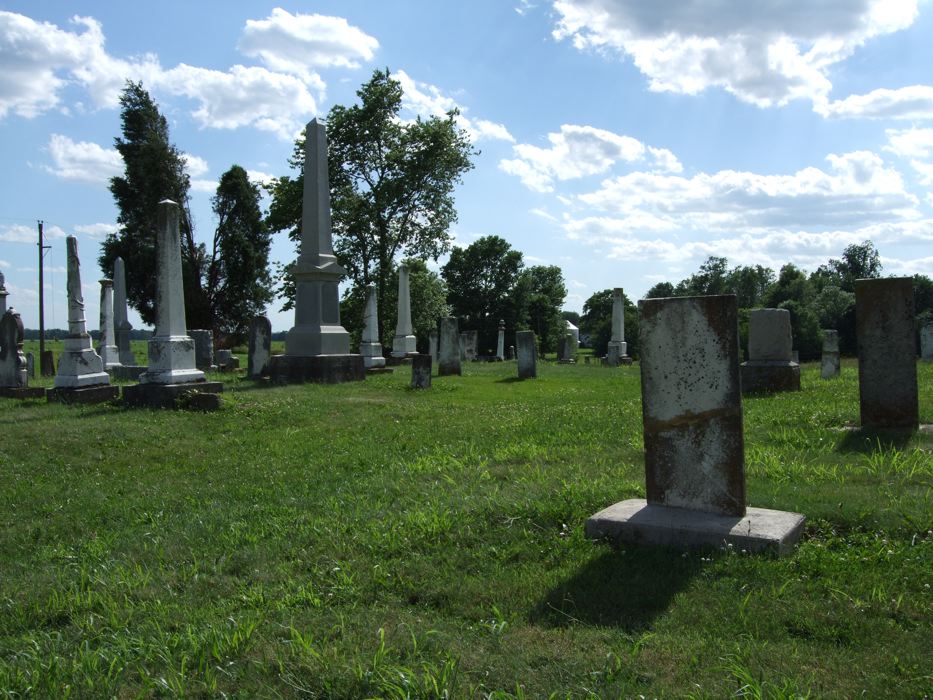
The REEVE Plot Is The Tallest Monument In The Distance
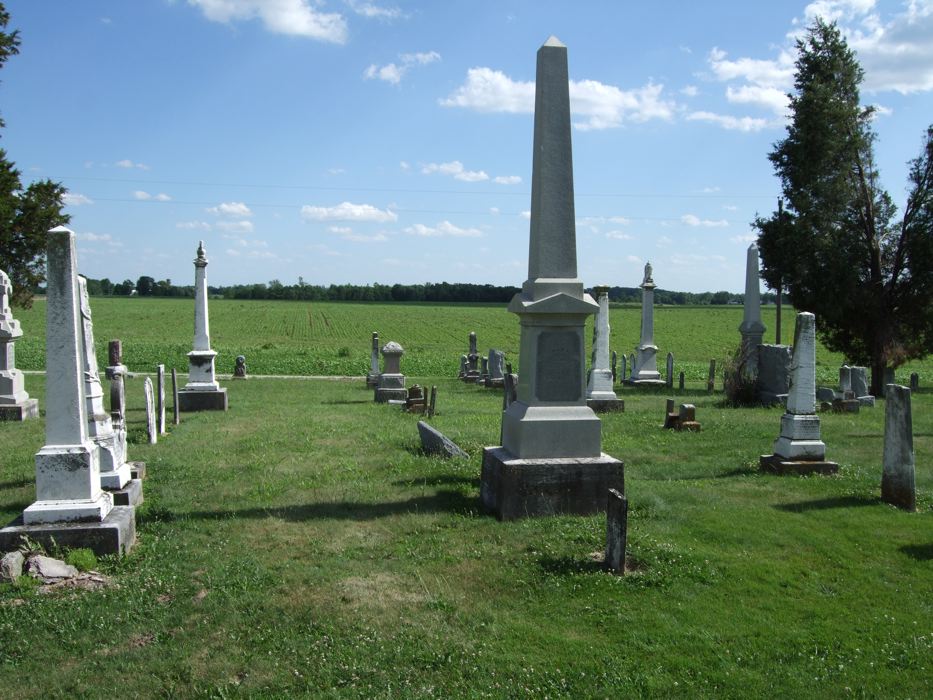
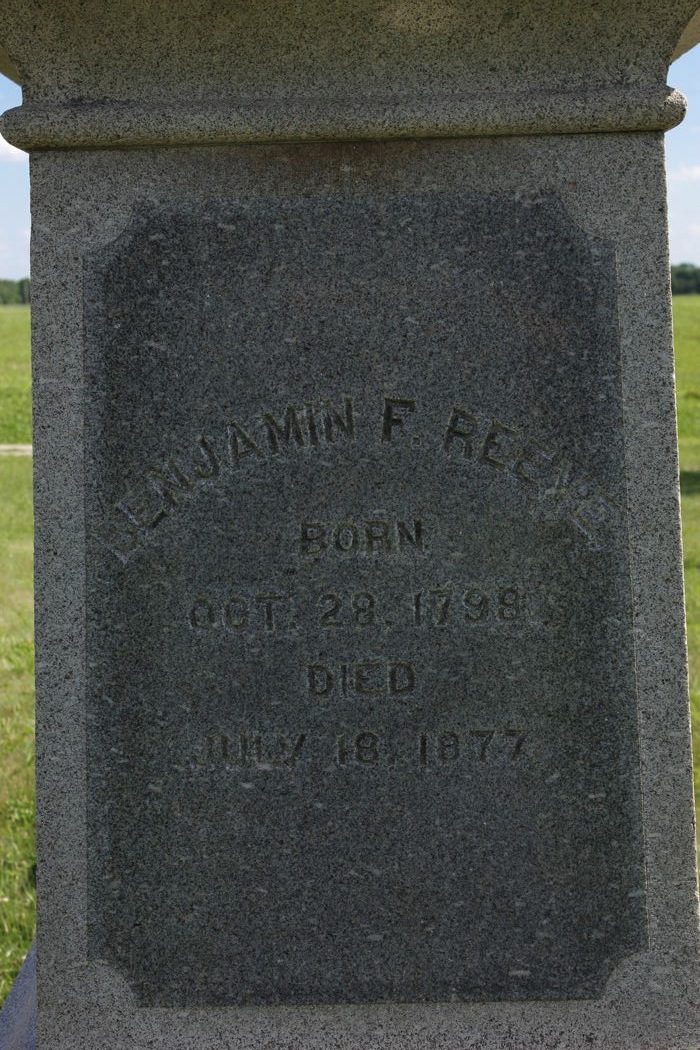
Benjamin F. Reeve
Born
Oct. 28, 1798
Died
July 18, 1877
![]()
Special Thanks
In June, 2009 Tom L. Childers, C. Wayne Kilpatrick and Scott Harp traveled about 3000 miles in one week through parts of Tennessee, Missouri, Illinois, Indiana and Kentucky. During this time we found the graves of 75 church leaders in the Restoration Movement. Chronicling these leaders into websites has been time consuming. Many thanks to Tom and Wayne in helping to take photos, share the driving, and putting up with your web master's slave-driving effort to see as many as we did in the time we had. Their photos as well as some of mine are seen on this site.
![]()
See Little Flat Rock Church And Cemetery Here
![]()
